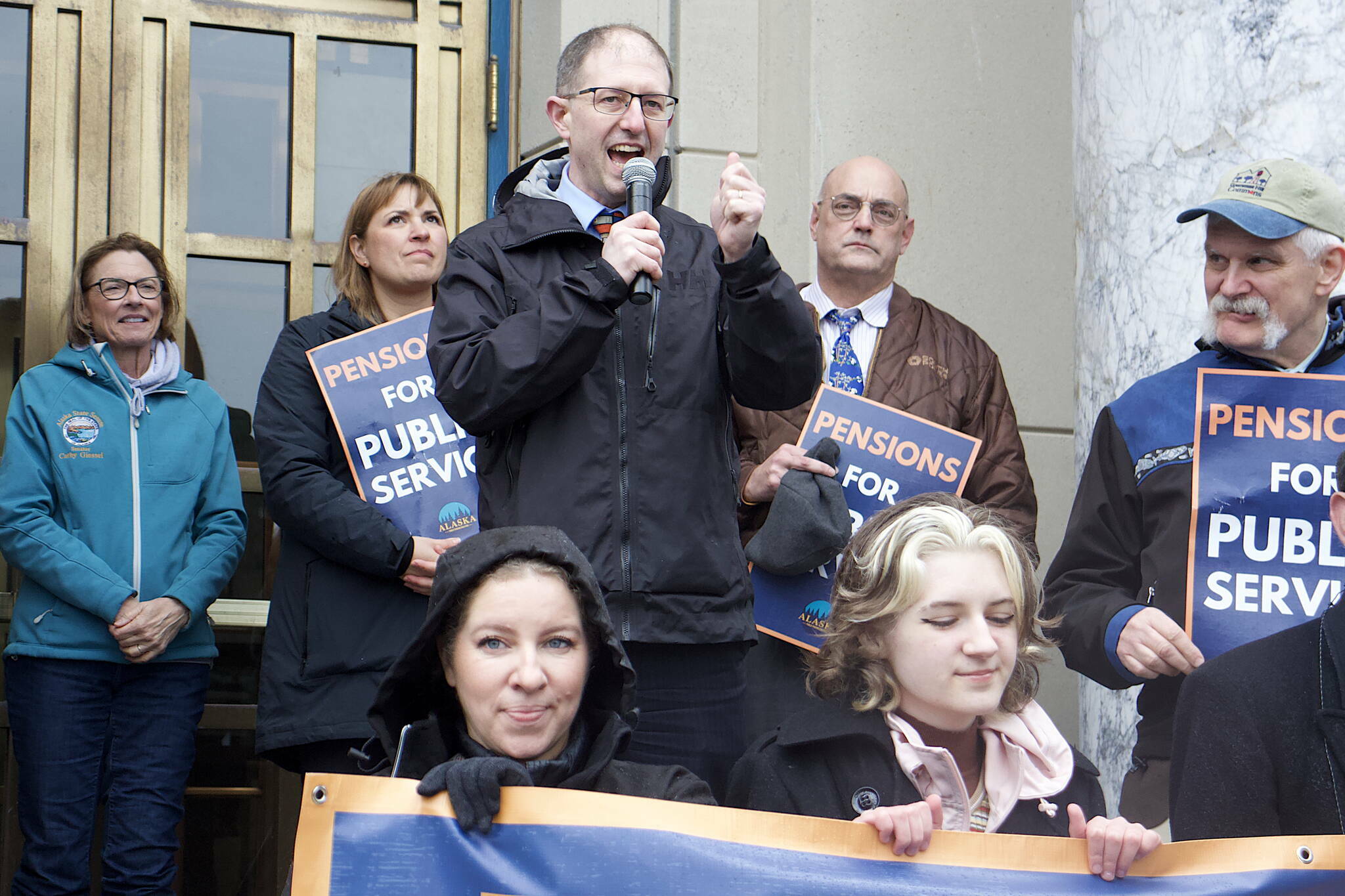A bill boosting public employee retirement benefits is heading to the state Senate floor after being advanced out of the Senate Finance Committee on Wednesday. However, while the bill is one of the top three declared goals of the bipartisan Senate majority, its fate in the Republican-led House is far less secure.
Senate Bill 88 would revive a pension-like system (referred to as defined benefit) in place of the existing 401(k)-style system (known as defined contribution), which supporters say is a key element to resolving a workforce shortage due to people being reluctant to apply for — and remain at — state and other public sector jobs.
”That is tremendous progress,” said state Sen. Jesse Kiehl, a Juneau Democrat and member of the finance committee, during a joint meeting Thursday morning of the state’s legislative delegation, Juneau Assembly and the city’s lobbyists. He said he expects a floor vote within the next week or two because there are still “a couple of details to get together” on what has been “a long, long-term priority of the Assembly, of mine and the whole delegation.”
Kiehl had sponsored a separate pension reform bill that he put on hold in favor of working on SB88, introduced by Senate Majority Leader Cathy Giessel, an Anchorage Republican, because “I don’t care whose name is on the bill.”
SB 88 requires new employees to enroll in the defined benefits system, while giving existing employees the option to switch. A study presented to the finance committee last year found a state employee hired in 2005 with a defined benefit pension would get about 30% of their salary after 15 years, while an employee hired under the defined contribution system in 2006 would get an average of about 18% and was more at risk to market volatility.
However, the Legislature adopted a defined contribution for new employees beginning in 2006 due to the pension system being significantly underfunded. Changes added to SB 88 during the committee process allow “both the employee and employer contribution rates to increase or decrease when necessary to ensure the plan is fully funded.”
There is a multitude of complex questions about re-implementing the pension system — which essentially all come down to costs to the state and effectiveness at retaining employees — which resulted in a prolonged debate about the bill in Senate committees during the past year. The House majority and Republican Gov. Mike Dunleavy have indicated extensive additional scrutiny is needed before approving any changes is considered.
“We’re getting a new actuarial on that and I think we’ll have that…I don’t want to say fairly quickly, because nothing ever happens fairly quickly as far as I’m concerned,” said Rep. Craig Johnson, an Anchorage Republican who chairs the House Rules Committee (which is accused by the Senate majority of rushing through a massive education bill during the first five days of this year’s session). “I’m just speculating on what I’ve heard coming from it, that it’s going to be very expensive for us to go back to a defined benefits program — in the billions. And I’m going to ask the same question that I’ve asked about education, of everything: where does the money come from?”
Two presentations to the Senate Finance Committee on Wednesday show how reviving pensions for public employees can be argued as having either a significant cost or significant savings.
A total cost of $1.2 billion in pension and health care costs during the next 16 years ($660 million in current dollars) is expected if a pension system is revived for current state employees, including $147 million in costs during the next five years, according to an analysis presented by Gene Kalwarski, CEO and founder of Cheiron, an independent pension consulting firm.
“(The) primary driver is change in member retention,” Kalwarski’s analysis states. Also, the projected total cost “does not reflect substantial economic benefits of restoring (defined benefit) pensions.”
Also, the analysis notes, higher retention of employees will increase payroll costs, with a $250 million difference in payrolls by 2039. But it states there are offsets to evaluate including cost savings in employee recruitment and training, improved and/or more efficient state services, and how the money received by state employees is spent and taxed within Alaska.
When all such factors are considered, “the most conservative — and incomplete — estimated cost savings created by switching to a (defined benefits) plan is $76M per year,” according to a study presented by Teresa Ghilarducci, a professor for the Schwartz Center for Economic Policy Analysis.
“This estimate is incomplete because it does not include direct employer contribution cost savings and the indirect, but real, gains to attracting private investment and economic development stemming from better public services,” her analysis states. “Nor does it include the indirect, but real, gains to higher quality teaching, police and fire, and other public services. The reinstatement of a defined benefit retirement (DB) plan for public employees could lead to substantial and sustained benefits in raising the quality of Alaska public services and making the state an attractive place to live and invest.”
• Contact Mark Sabbatini at mark.sabbatini@juneauempire.com or (907) 957-2306.

